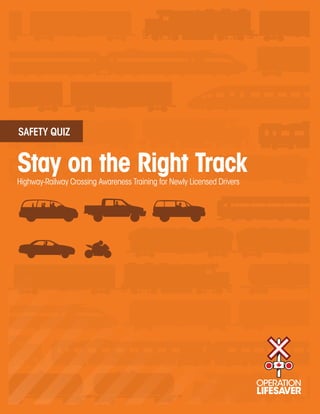Newly Licensed Drivers: Safety Quiz
- 1. SAFETY QUIZ Stay on the Right Track Highway-Railway Crossing Awareness Training for Newly Licensed Drivers
- 2. STAY ON THE RIGHT TRACK SAFETY QUIZ CIRCLE THE BEST ANSWER TO EACH QUESTION 1 Approximately, how many vehicle-train 6 When approaching a crossing without flashing collisions occur each year? lights, gates or bell, what should you do? a) 150 a) Turn up the volume of the radio. b) 250 b) Hurry across. c) 350 c) Nothing. Trains stop for vehicle traffic. d) 450 d) Slow down, look and listen for a train and be prepared to stop. 2 On average, over the past five years, how many fatalities occurred in vehicle-train collisions 7 If you are in the middle of a crossing and the each year? gate lowers, what should you do? a) 5 a) Stop. b) 15 b) Back up. c) 29 c) Try to lift the gate. d) 41 d) Keep going. Do not get trapped. 3 The crossbuck sign tells you: 8 Your vehicle is stuck on the track. What steps a) To hurry across the tracks. do you take? b) That there is only one railway track ahead. a) Stay in the vehicle. c) To slow down, look, listen, and be prepared b) Try to find a tow truck to move your car. to yield to an approaching train. c) Run down the track to wave down any approaching train. 4 How long does it take an average train travelling d) Get out and away from the tracks 100 km/h, pulling approximately 8,000 tonnes IMMEDIATELY and call proper authority of freight, to STOP after initiating an emergency for help. brake application? a) The length of a football field. 9 The primary contributing cause of vehicle-train b) 250 metres. collisions is: c) 500 metres. a) Weather conditions. d) Up to 2 kilometres. b) Malfunctioning warning devices. c) Poor eyesight. 5 When you see a train approaching, why is it d) Driver error. hard to judge its speed and distance? a) Trains can change speeds suddenly. b) An optical illusion makes the train appear to be farther away and moving slower than it actually is. c) Trains do not have two headlights. d) DriversŌĆÖ seating position affects their perception. 1
- 3. SAFETY QUIZ ANSWER TRUE OR FALSE TO EACH STATEMENT 10 When you are approaching a crossing 15 When approaching a highway-railway and the lights flash and the gates begin to come crossing, look in both directions and listen for down, a train is coming and you must stop prior to signals that may indicate the approach of a train. entering the crossing. 16 A STOP sign at a highway-railway crossing 11 When the gates stay down after a train has means the same thing as a STOP sign at any other passed on a crossing with more than one set of highway intersection. tracks, it means another train is coming. 17 The number posted below a crossbuck 12 A train can avoid a collision if the locomotive shows how many tracks there are at the crossing. engineer applies the brakes as soon as he sees a vehicle stalled on the tracks. 18 ItŌĆÖs okay for you to cross when the last car of a train clears the crossing. 13 Virtually all collisions between a vehicle and a train are preventable. 19 ItŌĆÖs illegal to drive around crossing gates. 14 A crossbuck is the most common warning 20 Most vehicle-train collisions occur when device at a highway-railway crossing. the train is travelling more than 50 km/h. This document may be reproduced without modification or alteration. ┬® 2011 Operation Lifesaver All Rights Reserved. 2




